- Home
- William Golding
Pincher Martin Page 6
Pincher Martin Read online
Page 6
He backed away with staring eyes and breath that came quick.
“Forget it!”
He began to thrust himself backwards into the sleeping crevice. He got almost to his ears out of sight and filled the hole with his body and heavy clothing. He pulled the sleeves of his duffle out of the oilskin tubes until they came over the backs of his hands. After a little struggling he could grip them with his fingers and double his fists so that they were hidden in the hairy duffle. The lifebelt supported his chest and throat once more and he pillowed his left cheek on his forearm. He lay so, shivering now that the sun had gone down, while the green sky turned blue, dark blue and the gulls floated down. His body yielded to the shivers but between the bouts it lay quite still. His mouth was open and his eyes stared anxiously into the darkness. Once, he jerked and the mouth spoke.
“Forget it!”
A gull moved a little then settled down again.
5
But he could not fall into the pit because he was extended through his body. He was aware dimly of returning strength; and this not only allowed him to savour the cold and be physically miserable but to be irritated by it. Instead of the apocalyptic visions and voices of the other night he had now nothing but ill-used and complaining flesh. The point of the needle in his eye was blunted but instead of enduring anything rather than its stab he had continually to rub one foot over the other or press with his body against the slab of rock in an effort to shut off the chill on that side, only to find that the other side required attention more and more insistently. He would heave the globe of darkness in which he most lived off a hard, wooden surface, rotate it and lay the other hemisphere down. There was another difference between this night and the last. The fires had died down but they were still there now he had the time and the strength to attend to them. The stiffness had become a settled sense of strain as if his body were being stretched mercilessly. The rock too, now that he had a little strength to spare was forcing additional discomfort on him. What the globe had taken in its extreme exhaustion for a smooth surface was in fact undulating with the suggestion of prominences here and there. These suggestions became localized discomforts that changed in turn to a dull ache. Allowed to continue, aches became pains then fires that must be avoided. So he would heave his thigh away or wriggle weakly only to find that the prominence was gone and had left nothing but an undulation. His thigh would flatten down again and wait in the darkness for the discomfort, the ache, the pain, the fire.
Up at the top end now that the window was dark the man found the intermissions of discomfort were again full of voices and things that could not but be seen. He had a confused picture of the passage of the sun below him beyond the central fires of the earth. But both the sun and the fires were too far away to warm him. He saw the red silt holding back the fresh water, a double handful of red sweets, an empty horizon.
“I shall live!”
He saw the sun below him with its snail movement and was confused inside his head by the earth’s revolution on its axis and its year-long journey round the sun. He saw how many months a man must endure before he was warmed by the brighter light of spring. He watched the sun for months without thought or identity. He saw it from many angles, through windows of trains or from fields. He confused its fires with other fires, on allotments, in gardens, in grates. One of these fires was most insistent that here was reality and to be watched. The fire was behind the bars of a grate. He found that the grate was in a room and then everything became familiar out of the past and he knew where he was and that the time and the words were significant. There was a tall and spider-thin figure sitting in the chair opposite. It looked up under its black curls, as if it were consulting a reference book on the other side of the ceiling.
“Take us as we are now and heaven would be sheer negation. Without form and void. You see? A sort of black lightning destroying everything that we call life.”
But he was laughing and happy in his reply.
“I don’t see and I don’t much care but I’ll come to your lecture. My dear Nathaniel, you’ve no idea how glad I am to see you!”
Nathaniel looked his face over carefully.
“And I, too. About seeing you, I mean.”
“We’re showing emotion, Nat, We’re being un-English.”
Again the careful look.
“I think you need my lecture. You’re not happy, are you?”
“I’m not really interested in heaven either. Let me get you a drink.”
“No, thanks.”
Nathaniel uncoiled from the chair and stood with his arms out on either side, hands bent up. He looked, first at nothing, then round the room. He went to the wall and perched himself absurdly high up with his bony rump on the top of a shelf. He pushed his incredible legs out and splayed them apart till he was held insecurely by the friction of the soles of his feet. He looked up at the reference book again.
“You could call it a talk on the technique of dying.”
“You’ll die a long time before me. It’s a cold night—and look how you’re dressed!”
Nathaniel peered at the laughing window then down at himself.
“Is it? Yes. I suppose I am.”
“And I’m going to have a damned long life and get what I’m after.”
“And that is——?”
“Various things.”
“But you’re not happy.”
“Why do you spill this over me, of all people?”
“There’s a connection between us. Something will happen to us or perhaps we were meant to work together. You have an extraordinary capacity to endure.”
“To what end?”
“To achieve heaven.”
“Negation?”
“The technique of dying into heaven.”
“No thanks. Be your age, Nat.”
“You could, you know. And I——”
Nat’s face was undergoing a change. It turned towards him again. The flush on the cheeks was painful. The eyes loomed and impended.
“—And I, have a feeling. Don’t laugh, please—but I feel—you could say that I know.” Below the eyes the breath came out in a little gasp. Feet scraped.
“—You could say that I know it is important for you personally to understand about heaven—about dying—because in only a few years——”
For a while there was silence, a double shock—for the bells ceased to toll beyond the windows of the room as though they had stopped with the voice. A vicious sting from his cigarette whipped along the arm into the globe so that he flicked it away and cried out. Then he was flat on the floor, fumbling for the stub under the armchair and the undulations of the floor were a discomfort to the body. Lying there, the words pursued him, made his ears buzz, set up a tumult, pushed his heart to thump with sudden, appalled understanding as though it were gasping the words that Nathaniel had not spoken.
“—because in only a few years you will be dead.”
He cried out against the unspoken words in fury and panic.
“You bloody fool, Nat! You awful bloody fool!”
The words echoed in the trench and he jerked his cheek up off the oilskin. There was much light outside, sunlight and the crying of gulls.
He shouted.
“I’m damned if I’ll die!”
He hauled himself quickly out of the crevice and stood in the trench. The sea and sky were dark blue and the sun was high enough not to make a dazzle from the water. He felt the sun on his face and rubbed with both hands at the bristles. He looked quickly round the horizon then climbed down to a trench. He began to fumble with his trousers, glancing furtively behind him. Then for the first time on the rock he broke up the bristly, external face with a shout of jeering laughter. He went back to the dwarf and made water in a hosing gesture at the horizon.
“Gentlemen are requested to adjust their dress before leaving.”
He began to fumble with the buttons of his oilskin and lugged it off fiercely. He picked and pulled at the tapes that he
ld his lifebelt inside the duffle. He slipped both off and dumped them in a heavy heap and stood there looking down. He glanced at the two wavy lines of gold braid on either arm, the gilt buttons, the black doeskin of his jacket and trousers. He peeled himself, jacket, woollen sweater, black sweater, shirt, vest; pulled off his long stockings, his socks, his pants. He stood still and examined what he could see of his body.
The feet had been so thoroughly sodden that they seemed to have lost their shape. One big toe was blue and black with bruise and drying blood. There were bruises on either knee that ended in lacerations, not cuts or jabs but places the size of a sixpence where the skin and flesh had been worn off. His right hip was blue as though someone had laid a hand dipped in paint on it.
He examined his arms. The right elbow was swollen and stiff and there were more bruises about. Here and there on his body were patches, not of raw flesh but of blood flecks under the skin. He felt the bristles on his face tenderly. His right eye was fogged and that cheek was hot and stiff.
He took his vest and tried to wring out the body but there was water held in the material that would not come free. He put his left foot on one end of the twisted cloth and screwed the other with both hands. Dampness appeared and moistened the rock. He did this in turn to each piece of clothing and spread the lot in the sun to dry. He sat down by the dwarf, fumbled in his jacket and brought out a sodden packet of papers and a small brown booklet. The colour had run from the booklet and stained the papers as if they were rusting. He spread the papers out round him and rummaged through his pockets in turn. He found two pennies and a florin. He laid them by the dwarf in a little heap. He took his knife on its lanyard from the pocket of his oilskin and hung it round his neck. When he had done that he put up his hand and tugged gently at the small brown disc that was tied round his neck by a white thread. He bent his face into a grin. He got up and scrambled over the rocks to the water-hole. He eased himself in and leaned forward. The red coils rose and reminded him of the other tamped end of the pool. He backed out carefully, holding his breath.
He climbed down over the trenches to the lower end of the rock. The water was low and tons of living jelly was spread in armour over the cliffs. Where he stood with his toes projecting over the edge the food was dry, and talked with continual tiny crepitations. The weed was transparent over the shells and only faintly green. He clambered down from handhold to handhold, wincing as he caught the sharp shells with his feet. He pulled at mussels but they would not come away. He had to twist them out as if he were breaking bones away from their tendons, screwing them out of the joints. He jerked them over his head so that they arched up and fell clattering on the rock. He worked among the sharp shells over the wavering water until his legs were trembling with strain. He climbed the cliff, rested, came back and twisted out more. There was a scattered harvest of them on the rock, some of them four inches long. He sat down, breathless in the sun and worked at them. They were not vulnerable like the red sweets; they were gripped and glued tight and there was nowhere to get the blade of the knife in. He put one on the rock and beat it with the haft of his knife until the shell fractured. He took out the complicated body and looked away over the sea.
“The Belgians do.”
He gulped the body down. He set his teeth, broke another shell. Soon he had a heap of raw flesh that lay, white and yellow on the dry rock. His jaws moved, he looked away at the horizon. The fogged side of his right eye was pulled slightly as he ate. He felt round with his hand and the heap was gone. He climbed down the cliff and got more. He opened each of these with a sudden downward jab of his knife. When they were gone he forced the red sweets from the rock and popped them in his mouth. He made no distinction between green and red. He took a wisp of green seaweed and chewed it like a leaf of lettuce. He went back to the water-hole, inserted himself and lay for a moment, looking down at the gleaming surface. He moistened his lips, so that the coils of red slime only stirred a little then lay down again. He eased himself out, clambered to the top of the rock and looked round. The horizon was ruled straight and hard in every part. He sat down.
The papers and booklet were still damp but he took up the booklet and opened it. Inside the cover was a transparent guard over a photograph. He peered through the cover and made out a fogged portrait. He could see a carefully arranged head of hair, a strong and smiling face, the white silk scarf round the neck. But detail had gone for ever. The young man who smiled dimly at him through fog and brown stains was distant as the posed portraits of great-grandparents in a faint, brown world.
Even so, he continued to look, searching for the details he remembered rather than saw, touching his bristled cheek while he divined the smiling smoothness of the one before him, rearranging the unkempt hair, feeling tenderly the painful corner of an eye. Opposite the photograph was writing in a slot but this too was smeared and washed into illegibility. He put the booklet down and felt for the brown disc hanging round his neck. He lifted the disc as far as the string would allow until it was close to his left eye. He strained back and got it far enough away from him.
CHRISTOPHER
HADLEY
MARTIN
TY. LIEUT., R.N.V.R.
C. OF E.
He read the inscription again and again, cut by cut. His lips began to move. He dropped the disc, looked down at his salted legs with their scars, at his belly and the bush of hair over his privates.
He spoke out loud, using his voice hoarsely and with a kind of astonishment.
“Christopher Hadley Martin. Martin. Chris. I am what I always was!”
All at once it seemed to him that he came out of his curious isolation inside the globe of his head and was extended normally through his limbs. He lived again on the surface of his eyes, he was out in the air. Daylight crowded down on him, sunlight, there was a sparkle on the sea. The solid rock was coherent as an object, with layered guano, with fresh water and shell-fish. It was a position in a finite sea at the intersection of two lines, there were real ships passing under the horizon. He got quickly to his feet and laboured round the rock, turning his clothes in the sun. He sniffed the pants and laughed. He went back to the papers and turned them. He took up the coins, chinked them in his hand for a moment and made as if to toss them in the sea. He paused.
“That would be too cracker-motto. Too ham.”
He looked at the quiet sea.
“I don’t claim to be a hero. But I’ve got health and education and intelligence. I’ll beat you.”
The sea said nothing. He grinned a little foolishly at himself.
“What I meant was to affirm my determination to survive. And of course, I’m talking to myself.”
He looked round the rock.
“The first thing to do is to survey the estate.”
The rock had diminished from an island to a thing. In the sunlight and absence of cold the whole could be inspected not only with eyes but with understanding. He saw at once that the trenches were the worn ends of vertical strata and the walls between them, harder layers that had worn more slowly. They were the broken end of a deep bed of mud that had been compressed by weight until the mud had heated and partly fused. Some convulsion of the upper layers, an unguessable contortion, a gripe of the earth’s belly had torn the deep bed and thrust this broken end up vertically through mud and clay until it erupted as the tooth bursts out of the fleshy jaw. Then the less compressed layers had worn away into trenches full of edges like the cut pages of a book. The walls too were broken in places and modified everywhere by local hazard. Some of the walls had fallen and lay jumbled in the trenches. The whole top of the rock tended down, trench by trench, from the west to the east.
The cliff sides of the rock concealed the stratification for they were water-worn and fretted into lace by the plant-animals that clustered so thickly on them. This top was concreted with whiteness under stinking water but down there where the blue and shattered mussel-shells lay scattered, the rock was clean or covered with barnacles and weed.
Beyond the rock was a gap of shallow water, then another smaller rock, another and another in a slightly curving line. Then there was a pock that interrupted the pattern of the water and after that, the steep climb of the sea up to the sky.
He looked solemnly at the line of rocks and found himself thinking of them as teeth. He caught himself imagining that they were emerging gradually from the jaw—but that was not the truth. They were sinking; or rather they were being worn away in infinite slow motion. They were the grinders of old age, worn away. A lifetime of the world had blunted them, was reducing them as they ground what food rocks eat.
He shook his head irritably then caught his breath at the sudden pain in his neck.
“The process is so slow it has no relevance to——”
He stopped. He looked up into the air, then round over his shoulder. He repeated the words carefully, with the same intonation and at the same strength.
“The process is so slow——”
There was something peculiar about the sound that came out of his mouth. He discounted the hoarseness as of a man recovering from a cold or a bout of violent shouting. That was explicable.
He sang loudly.
“Alouette, gentille Alouette——”
He held his nose with his right hand and tried to blow through it until the pressure rounded his cheeks. Nothing cracked in his ears. His eyes hurt and water ran round them. He bent down, put his hands on his scarred knees and turned his head sideways. He shook his head violently, ignoring the pain in his neck and hoping to feel the little wobbling weight that would tell of water caught in his ears.
He stood up, facing a whole amphitheatre of water and sang a scale.
“Lah-la, la, la, la, la la-lah!”
The sound ended at his mouth.
He struck an attitude and declaimed.
The weary moon with her lamp before

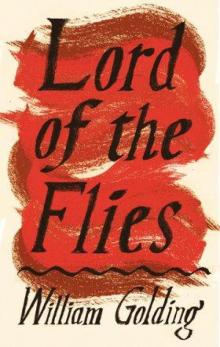 Lord of the Flies
Lord of the Flies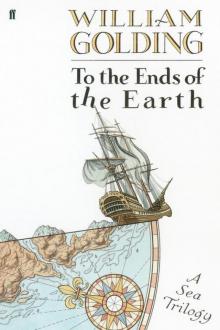 To the Ends of the Earth
To the Ends of the Earth Free Fall
Free Fall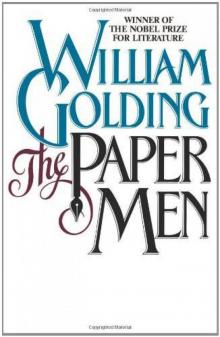 The Paper Men
The Paper Men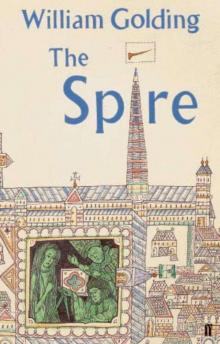 The Spire
The Spire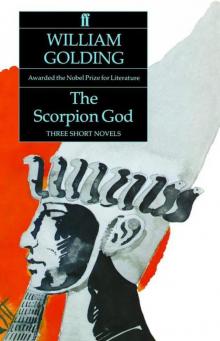 The Scorpion God: Three Short Novels
The Scorpion God: Three Short Novels The Inheritors
The Inheritors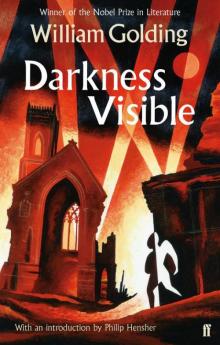 Darkness Visible: With an Introduction by Philip Hensher
Darkness Visible: With an Introduction by Philip Hensher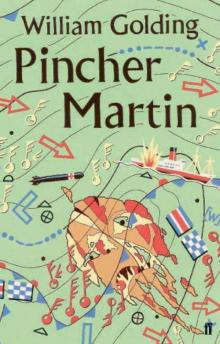 Pincher Martin
Pincher Martin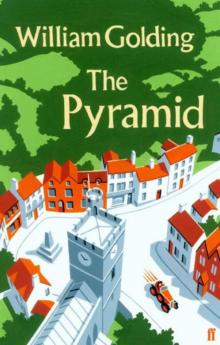 The Pyramid
The Pyramid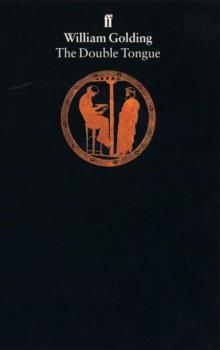 The Double Tongue
The Double Tongue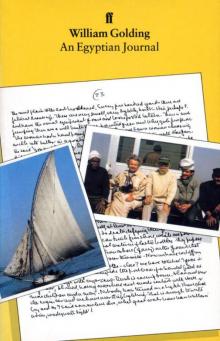 An Egyptian Journal
An Egyptian Journal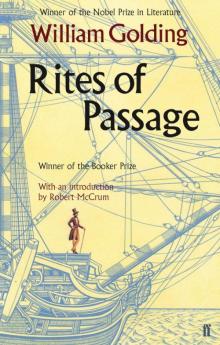 Rites of Passage
Rites of Passage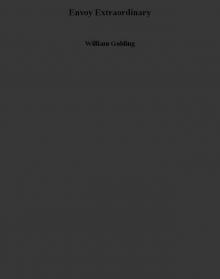 Envoy Extraordinary
Envoy Extraordinary